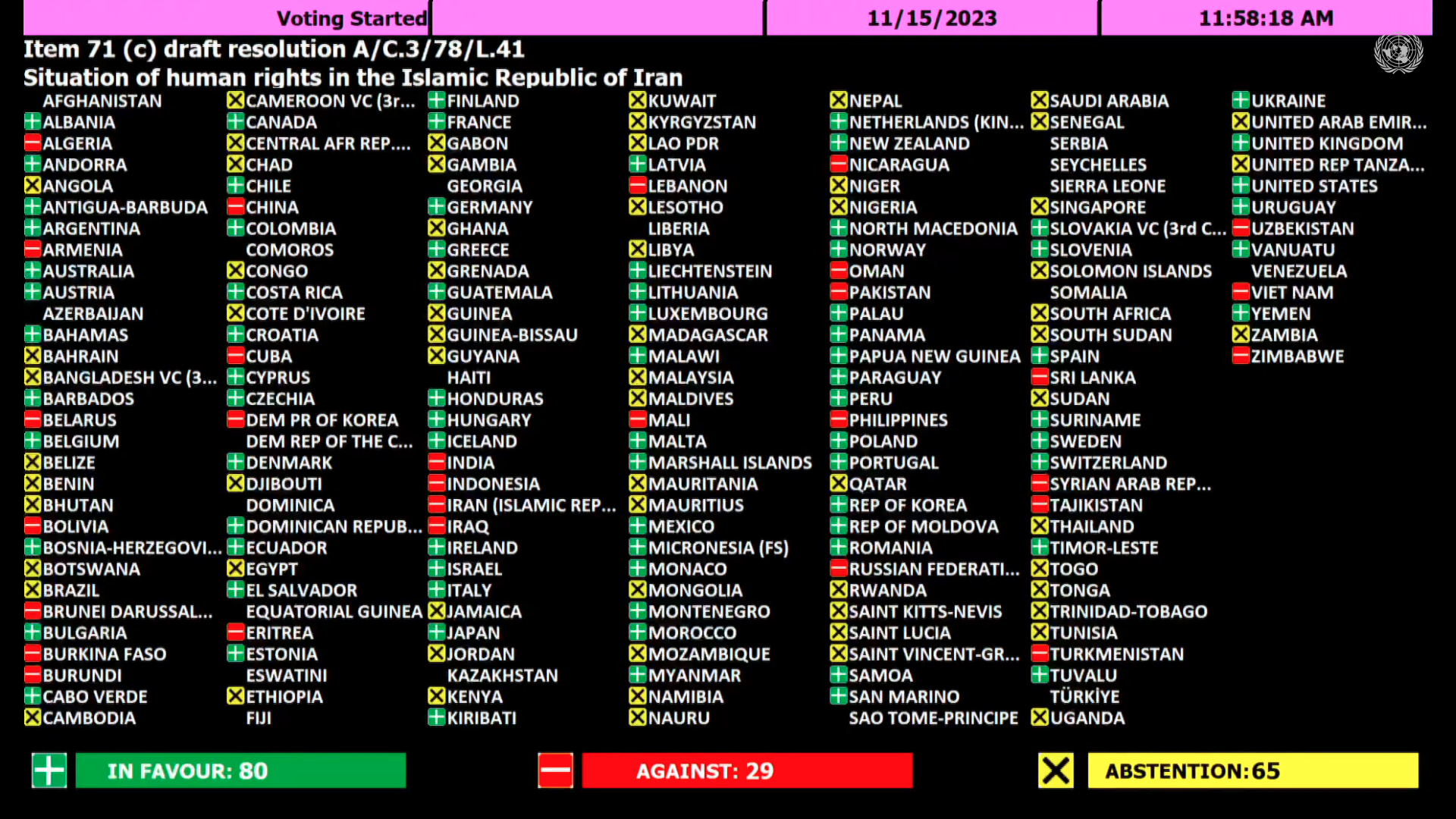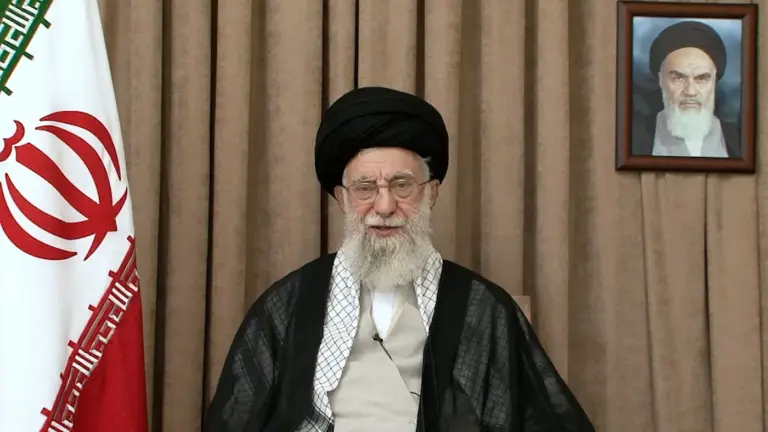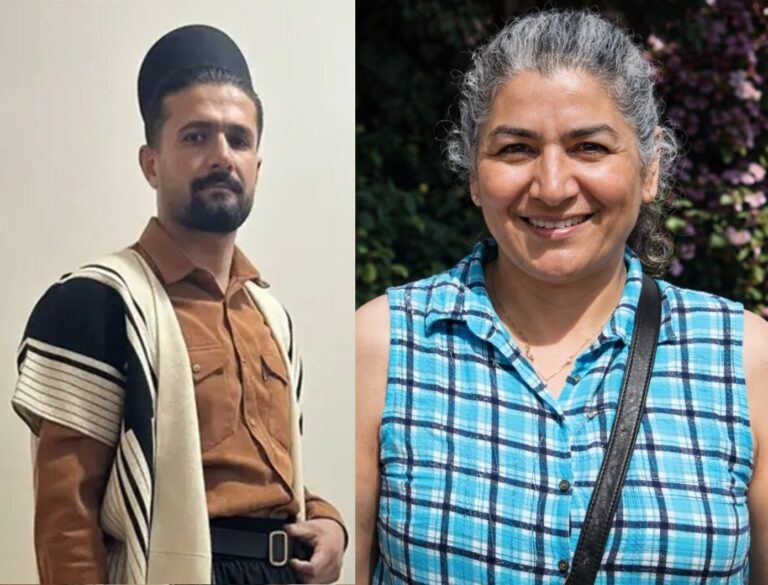
The full list of votes on 15 November.
The United Nations General Assembly adopted a resolution last week highlighting violations of human rights in Iran, including “ongoing severe limitations and increasing restrictions on the right to freedom of thought, conscience, religion or belief”.
The resolution, which was passed on 15 November by 80 votes to 29, with 65 abstentions, names Christians and “particularly converts from Islam” among the recognised and unrecognised religious minorities affected by violations “including but not limited to increased harassment, intimidation, persecution, arbitrary arrest and detention, and incitement to hatred that leads to violence”.
It also notes “restrictions on the establishment of places of worship”. (As Article18 has highlighted, Persian-speaking Christians in Iran – and especially converts to Christianity – have no place to worship, as they are not permitted to access the churches of recognised Christians of Armenian or Assyrian descent, nor to meet together in private homes in what have become known as “house-churches”, as these have been outlawed by the state and labelled “enemy groups”.)
Iran must “cease monitoring individuals on account of their religious identity”, the resolution states, and “release all religious practitioners imprisoned for their membership in or activities on behalf of a minority religious group … and ensure that everyone has the right to freedom of thought, conscience and religion or belief, including the freedom to have, to change or to adopt a religion or belief of their choice, in accordance with its obligations under the International Covenant on Civil and Political Rights [ICCPR]”.
The resolution also “expresses serious concern at the widespread restrictions on the rights to freedom of peaceful assembly and association and freedom of opinion and expression, both online and offline”, and calls on the Islamic Republic “to eliminate, in law and in practice, all forms of discrimination on the basis of thought, conscience, religion or belief, including restrictions contained in [the amended] article 499 bis and article 500 bis of the Islamic Penal Code”, which it says have “significantly escalated discrimination and violence … and other human rights violations against persons belonging to recognized and unrecognized religious minorities”.
It also calls on Iran to “end ongoing systemic impunity” for those who commit crimes against members of these groups; to “cease the widespread and systematic use of arbitrary arrests and detention”; “respect the prohibition of torture and other cruel, inhuman or degrading treatment or punishment”; “ensure a fair trial, including timely access to legal representation of one’s choice from the time of arrest through all stages of trials and appeals”; and “address the poor conditions of prisons, urges an end to the practice of deliberately denying prisoners access to adequate medical treatment and supplies, safe drinking water, sanitation and hygiene”.
What was said during the debate?
The resolution was presented by Canada, which noted the “persisting systemic persecution of ethnic and religious minorities” in Iran, among other issues.
There were also statements in support of the resolution from the representatives of the United States, Australia, Israel, and Spain, which spoke on behalf of the European Union.
The Australian representative said his country “remains gravely concerned about the deteriorating humans rights situation in Iran, especially around the persecution of women and girls, and oppression of ethnic and religious minorities”.
The Israeli representative expressed “serious concern about ongoing severe limitations and increasing restrictions on the right of freedom of thought, conscience, religion or belief, as well as persecution, arbitrary arrest and detention against persons belonging to religious minorities in the country”.
Meanwhile, the representative from Brazil, which abstained from voting “in the spirit of constructive dialogue”, highlighted the Baha’is’ inability “to exercise their faith freely and peacefully in Iran”.
Iran’s representative said the Islamic Republic “vehemently rejects the bias and politically motivated resolution”, which she claimed the “classic cast of characters and the usual suspects” – Canada, the UK, France, Germany, the US and Israel – were using “to advance their political agenda”.
Other states that made objections to the “country-specific” resolution included Venezuela, Pakistan, Cuba, Nicaragua, Russia, Syria, Eritrea, China, Belarus, and North Korea.
In response, the Australian representative said: “We have again heard suggestions that country-specific resolutions impede sovereignty. UN member states are indeed sovereign, but sovereignty is not a shield against international scrutiny for behaviour that impinges on universal human rights.
“No country is above fair scrutiny of its human rights obligations. The international community cannot turn a blind eye to these violations and suggest that deaths, violence, arbitrary detention, discrimination and oppression are internal matters. To do so would be to ignore the human rights of the individuals that we, the United Nations, have committed to promote and protect.”
Other recent UN reports
Earlier this month, the UN Human Rights Committee in Geneva reminded Iran of its obligations as a signatory of the ICCPR, saying that Iranians of all faiths should be able to “manifest [their] religion or belief without being penalised”, and members of non-recognised religious minorities must be “protected against harassment, discrimination and any other human rights violation”.
Meanwhile, in October, the latest report of the UN Secretary-General on the situation of human rights in Iran noted the reported arbitrary arrests of at least 69 Christians across 11 Iranian cities between 1 June and 17 July.
“According to information received, some of those detained were charged with ‘acting against the national security through establishing or membership of a house church’,” the report stated. “Those released were reportedly forced to sign commitments to refrain from further ‘Christian activities’ or forced to attend Islamic re-education sessions. Others were summoned for further questioning in the days after their release, ordered to leave the country or had their employment terminated.”
The report called on Iran to “protect the rights of all persons belonging to ethnic and religious minorities and address all forms of discrimination against them without delay”, as well as to “release immediately all persons detained arbitrarily … for legitimately exercising their rights to freedom of opinion and expression, association and peaceful assembly”.




0 Comments